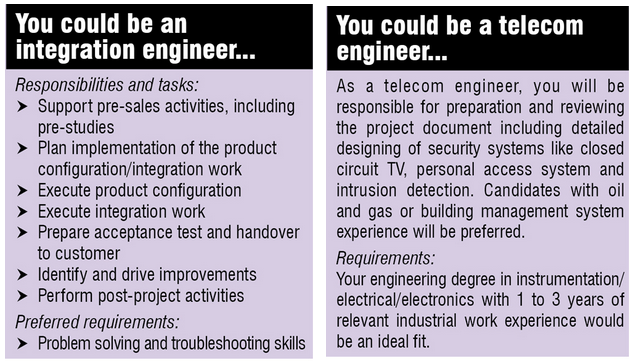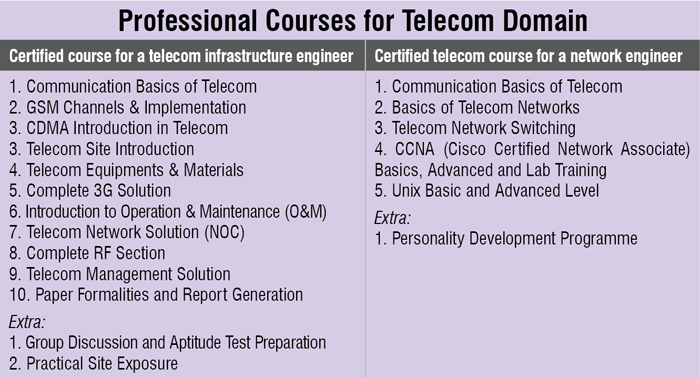According to a recent report, telecommunication services are likely to grow to 15% of the GDP by 2015. The escalation in the domestic market is expected to grow with the arrival of new players and launch of new services. This growth potential in the sector makes it a highly sought after sector by professionals. Let us dive straight into the kind of roles available for an engineer in this sector, followed by the diverse responsibilities of telecom engineers and their remuneration.
There are various roles available for engineers, such as radio frequency (RF) survey engineer, base transceiver station (BTS) engineer, microwave engineer and spectrum analysis engineer. But all these are limited in terms of numbers and allocation to fresh engineering graduates. For freshers, jobs are available mostly as network and integration engineers or as software/application developers.
A network engineer performs design, audit and optimisation of a network to meet a customer’s requirements. This role is applicable for design and optimisation of radio access network, transmission, core and services networks. The network engineer can also be engaged in the whole process from pre-sales of services and networks to service delivery and acceptance. Basically, the role is more focused on executing, audit, design and optimisation services, where the network engineer is responsible for a part of the solution and a part of the service process. As a result, the engineer is responsible to keep timing, performance and quality according to requirements and the contracts.
An integration engineer can be expected to analyse, prepare, implement and verify the configuration and integration of a node, network or a system. A software engineer focuses on projects where C/C++ programming language is widely used. For managing the products, Java is the preferred language.

Tasks and responsibilities
The responsibilities in this sector depend on the position one holds. Depending on the area, be it installation, software, infrastructure or network, the tasks differ from company to company. See the boxes for some of the latest job profiles at reputed organisations hiring engineers to work in the telecom domain.
How remunerative is the job
For software engineers, George Abraham, associate vice president-Recruitment, Sasken Communication Technologies Ltd, informs, “The CTC (cost to company) would be 315,000 rupees per annum with medical, superannuation benefits provided additionally. Entry-level freshers will undergo foundational competency training (three months) and domain hands-on training (six months). Then they will have opportunities to work in software development and testing in the telecom embedded system domain.”
As per figures provided by TimesJobs.com, 48% of the engineers working in telecom sector, who are basically freshers, get anywhere between 80,000 and 300,000 rupees per annum. Middle-level 25% engineers draw anywhere between 400,000 and 700,000 rupees per annum and senior 15% engineers are paid one million rupees and above.


According to PayScale.com, a telecom engineer earns an average salary of 403,545 rupees per annum. Experience does have a moderate effect on pay in this sector. A skill in network management or administration is associated with higher pay for the job. But a telecom network engineer earns an average salary of 359,426 rupees per annum. The skills that increase pay for this job the most are an understanding of GSM and telecom. Most people with this job profile move on to other positions after about ten years in this sector.
Minimum qualification required
Ideally, telecom companies look for graduates (B.E./B.Tech in ECE/CS/Telecom) with good academic record of anywhere between 60% and 70% aggregate in all papers in engineering and having cleared in first attempt. Some companies also recruit EEE and IT graduates and provide necessary training.
Demand areas
Going by the statistics provided by TimesJobs.com, Bengaluru tops the list of top five cities hiring engineers for telecom sector, with a share of 28%. Second in the list comes Delhi with 16% of the jobs. Mumbai falls next with 13% while Chennai and Pune share 11% of the jobs each.
hiring engineers for telecom sector, with a share of 28%. Second in the list comes Delhi with 16% of the jobs. Mumbai falls next with 13% while Chennai and Pune share 11% of the jobs each.
Understandably, a big chunk of the jobs for engineers is in software domain; 22% of the jobs being for software engineers and application programmers each. Roughly 8% of the jobs are in areas of RF engineering and hardware installation or maintenance. About 7% of the jobs are for network administration.
Professional courses could be an option
Although some companies have their own in-house training facilities to train new entrants, the others look for candidates with some kind of experience or formal training in the subjects. There are a handful of organisations that provide professional certification courses in India. Typically, these training programmes are designed to give candidates an overview of communication, GSM and CDMA systems. These provide a more practical approach towards the telecom industry.
There are several professional courses for telecom domain with duration of one to six months. Depending on your field of interest, you could go for that particular course. In the programme structure, the topics that are touched upon during these courses are highlighted in the box below. These could, again, vary from one institute to another, some of whom also provide placement and guidance.






